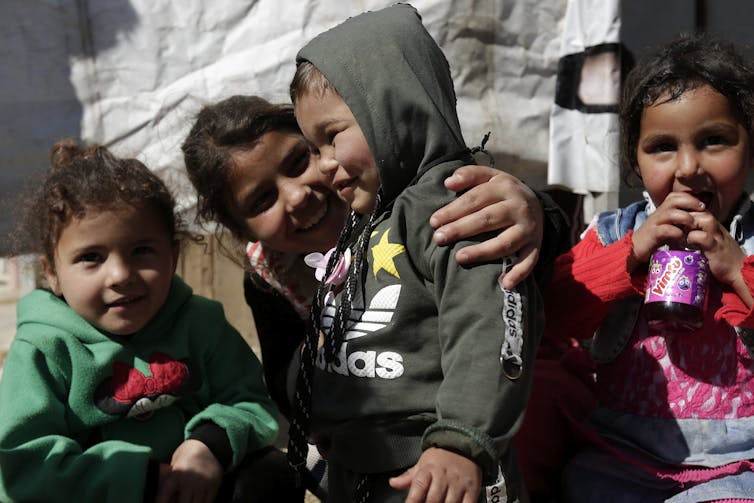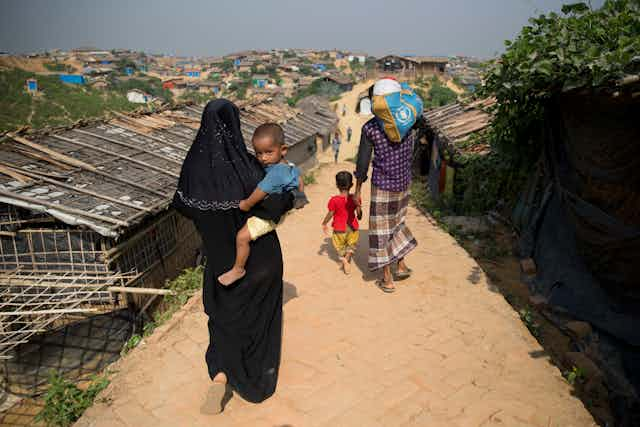An estimated 70 million people worldwide have been forcibly displaced, according to the United Nations. Every two seconds, someone in countries like Syria, Afghanistan, South Sudan and Myanmar is being forced to leave their home. Although 24.5 million of these people have fled their countries to escape conflicts and persecution, room for them isn’t opening up at the same pace. That’s creating a global crisis at a time when the number of refugees stands at record levels.
Governments are taking actions that address the refugee crisis but are failing to fully meet the need. Charities, such as Mercy Corps, Save the Children and the International Rescue Committee continue to play a role. That work is funded by donations.
About half of refugees who entered the U.S. in 2016 and 2017 were Muslim, as were more than three-quarters of refugees who arrived in Europe between 2010 and 2016. Because most Americans identify as Christians, and Islamophobia appears to be on the rise among Americans, we wanted to see whether anti-Muslim sentiment or religious identity might be affecting the willingness in this country to support nonprofits that help refugees abroad.

Studying these perceptions
To find out, we – two professors who study nongovernmental organizations – conducted an experiment. We modeled how likely Americans would be to say they would donate US$20 to a charity that runs refugee camps abroad if they were told, directly or indirectly, that most of the refugees in the camps were Muslims.
In the first of two parts of this survey, the participants saw information about a charity and responded to questions about it and about whether they would donate to it. In the second part, they answered questions about themselves, such as their gender, educational background, income, religion and political affiliations.
Nearly half, 46.5%, of the 1,089 participants identified as Christians, 10.3% identified as non-Christians – mostly Muslims, Hindus, Jews and Buddhists, and 43.2% did not identify with any of the denominations we listed.
We posted our survey online on the Amazon Mechanical Turk (MTurk) website. Anyone can register on this platform and perform the assorted odd jobs they will find on a list. The 1,089 participants who chose to complete our survey are a random group but the religious beliefs of these people are not representative of the U.S. population at large. Nevertheless, this approach made it possible for us to survey a much more diverse and broader set of people than if we had asked, say, college students to participate in our experiment.
Each participant saw the profile of a fictitious nonprofit we called “Refugee Helpers.” Everyone was assigned randomly to see one of the 11 different versions of the profile we created, so about 100 people saw each one.
One profile suggested that the charity was serving mostly refugees who were Muslims. Another version described the refugees as belonging to all faiths. A third said the group mostly helped Christian refugees.
We referred to the religion of refugees in other ways. Some profiles stated that the refugee camps were located in Turkey, Jordan and Lebanon – three Middle Eastern and largely Muslim countries. Others placed the refugee camps in the predominantly Christian African countries of Ethiopia, Kenya and Uganda.
We used imagery to simulate this distinction as well, with a picture of women wearing hijabs that showed up in one of the profiles but not the rest. Finally, some people were told that the charity was secular. Others were led to believe that it was a Muslim-led group.

No penalties
After participants learned about what our fake charity supposedly did, we asked how likely they would be to donate $20 to support its work. To be clear, no money changed hands.
Participants who thought that most of the refugees were Muslim were no less likely to say they would donate than participants who believed the refugees included Christians and people following other faith traditions. In other words, telling participants explicitly that their donation would help Muslims did not make them less willing to say they would give to Refugee Helpers. Participants did not penalize Refugee Helpers for whom it was helping, suggesting that Islamophobia was not affecting their giving decisions.
But we did see the effects of religious identity in three situations.
First, people who believed the refugees were mostly Christian were slightly more willing to give $20 to the charity than those who were told it helped refugees of all faiths. This finding became stronger when we noted that the refugee camps were in the Middle East.
For example, if an average person saw our most vague profile of Refugee Helpers, which did not specify the religion of the refugees or the location of the refugee camps, the probability that they would say “yes, I am willing to give Refugee Helpers 20 bucks” would be about 44%. But if the same average person thought that the refugees it assists were mostly Christians and that the camps were in the Middle East, the probability that this person would be willing to give jumps by 11 percentage points to 55%.
We don’t believe Islamophobia caused this disparity. Instead, we believe this supports what’s known as a “persecuted minority” syndrome. Americans are prone to be more willing to help Christian refugees in the Middle East because, in the Middle East, minorities such as Christians and Kurds are seen as facing oppression from the Islamic State Group.
Christians were also more apt to say they’d support the charity if they thought it aided Christian refugees, rather than Muslims. Specifically, the probability of Christian participants being willing to give went up in this instance by 9 percentage points, to 57% from 48%.
We don’t blame Islamophobia for that either. In most religions, people tend to favor people who share their faith over those who don’t.
The third instance was when we told survey participants that Muslims ran the charity. When we did that, participants were less likely to say they were willing to donate than the people who were told about it being a secular nonprofit. Believing that Refugee Helpers is an Islamic organization, rather than secular, reduces the probability that an average person would be willing to give by 11 percentage points from 44% to 33%.
Our findings indicate that Islamophobia may affect charitable giving, but only in a specific context. People in the U.S. do not seem less willing to donate to secular groups that help Muslims. But they do appear to be much more cautious about giving to a charity that identifies as Islamic, even if it serves people of all faiths.

